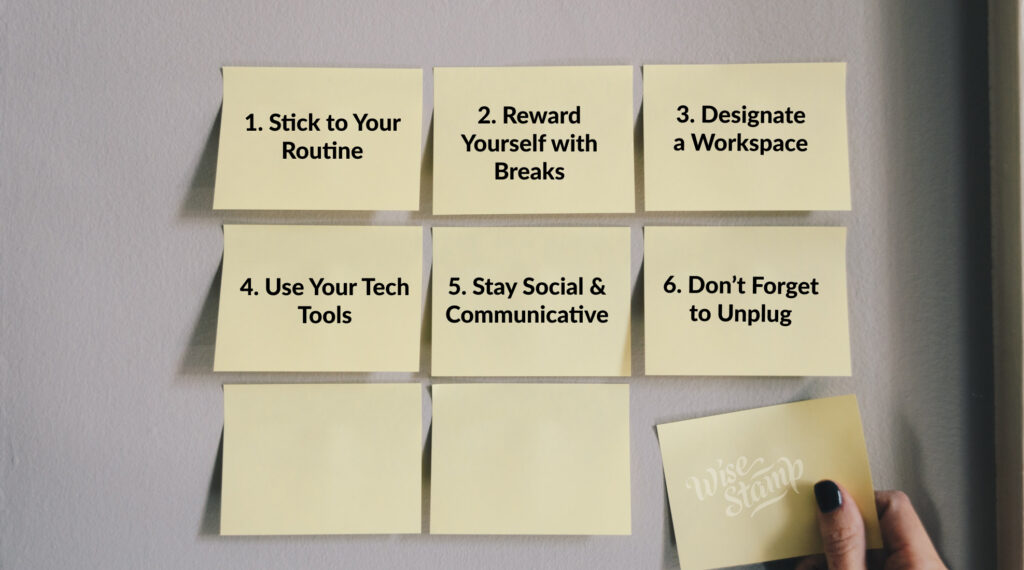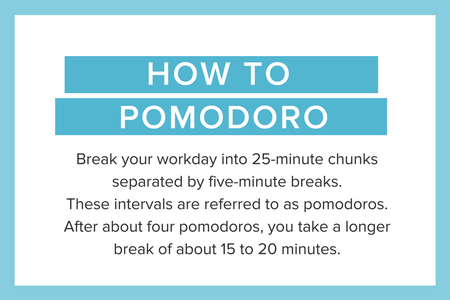Work from home productivity: 6 tips to free up time
Find out the best ways to stay productive when working from home, some say that you maybe even more productive at home than the office.

top tips to work from home, many people subscribe to the notion that working from home is almost like taking a day off. You can sleep in, exercise more, and use your time to do things other than working. I hate to be the bearer of bad news, but this isn’t the case. Your work doesn’t take a backseat just because you’ve changed your surroundings.

You may think that working from home seems impossible. Working from home productivity can be affected, there are plenty of distractions, ranging from family or roommates, house tasks, and the proximity to your comfy bed. However, with a few tweaks in both your mindset and your surroundings, working from home can actually be highly rewarding.
Here, we’ll take a look at a few tried and true tips on how to work from home and stay productive. And, if your business is having trouble adapting to this new lifestyle check this article out, it may help! First, let’s look at the advantages and disadvantages of working from home.
Effectively working from home benefits
A lot of employees request to work from home if they have a sick child to take care of, for example. However, there are several other reasons why working from home can be advantageous.
1. Working from home time management
Working from home affords you the ability to keep a flexible schedule. If you have a doctor’s appointment in the middle of the day or you need to pick up your kids from school, you don’t have to leave the office early. You can create a schedule that allows you to come back to your work when it’s convenient for you and finish it in your own time.
2. Productive home office
If you spend hours each day commuting to and from the office, working from home can be a welcome change from the daily traffic jams. The time you would have spent stuck in your car or on a bus can now be used for starting work earlier (or spending extra time in bed… we won’t judge).
3. Save Money
You’re saving time by not commuting, but you’re also saving money on things like gas and the bus fare. Most of all, since you have your kitchen at your fingertips, you don’t need to go out at lunchtime and spend frivolously on food when you can make a healthy and nutritious meal for a fraction of the cost.
4. Multitasking
Think of all the time you waste at the office doing things unrelated to your tasks. Chatting with coworkers, taking smoke breaks, scrolling through social media. You can still take those breaks while working from home, but make them more productive by doing things you need to do anyways, like walking the dog, putting a load of laundry in the washer, or organizing your room.
5. No Distractions
While some people thrive in social office settings, others may find it distracting. If you work with a big team, or if you’re friendly with your coworkers, you may find it challenging to get work done when it’s so tempting to chat with the person next to you. Working from home eliminates that struggle.

Hardship of being productive at home
Some people worry about staying focused and stimulated when working from home alone. Of course, there are a few other reasons why working from home can have a negative impact on your productivity.
1. Lack of Self-Discipline
Without the willpower to dedicate yourself to your work from the same amount of hours as you would in an office, working from home can seem impossible. Factor in all the distractions around you, like that new show that just came out on Netflix, and you’ve got a recipe for procrastination.
2. Not Enough Resources
In the office, you have two monitors, the strongest WiFi on the market, and a ton of coworkers who can help you out if you get stuck. At home, you have a small laptop, WiFi that drops connection when you stray too far from the router, and a cat that blankly stares at you while you work.
3. No Socializing
Not everyone finds the office distracting. Some people enjoy socializing with their coworkers in order to refresh themselves in between heavy tasks. When working from home, it can be difficult to recreate that social aspect of the office.
4. Time-Sensitive Tasks
It can be frustrating to wait for an answer to an email for a simple question when at the office you can simply walk over to someone’s desk and have the matter sorted in minutes. Effectively working from home requires a lot more patience and diligence.
Working from home best practices
You don’t need to decide if the costs outweigh the benefits because there are a few ways you can ensure that your work from home experience remains productive, dynamic, and rewarding.
How do I know? I’ve done it myself. A year ago, I shifted from working full-time in an office to working remotely as a freelancer, and I’ve collected some helpful tips to share with you that have helped me stay focused and on track with my work. Working from home productivity tips and tricks!

1. Stick to Your Routine
You probably have a routine when it comes to waking up and getting ready to go to the office. When working from home, it’s easy to forget this routine, but it’s wise to keep it in place.
Treat your work from home like any other day of work that you’d go into the office for. Wake up at the same time, wash up as you normally would, get dressed, have breakfast, get the kids ready. Do whatever it is that you normally do each morning.
The same goes for your routine throughout the day. If you give yourself specific break times, or you’re used to having a cup of coffee after your lunch break, then maintain the same habits at home.
Of course, working from home has its perks. Personally, I don’t put on makeup or dress nicely if I know I’m not leaving my house for the day, but changing out from your PJs or lounge clothes will help your mind shift between ‘work time’ and ‘rest time.’
2. Reward Yourself with Breaks
No one can work straight through an eight-hour shift without taking regular breaks. You’d do this in the office by chatting with a co-worker or going to make a coffee, and it’s important to carry this over into your work-from-home routine.
A good way of doing this while maintaining productivity is by setting yourself small, attainable goals. For example, when I work, I like to take a break after every 500-700 words written. It gives me a chance to take a breather from my task, rest for a few minutes, and refocus. Additionally, while I’m working, I don’t check my phone, go on social media, or give in to any other distractions. By focusing on finishing a task in order to take a break, you’ll motivate yourself to really work.
Another method is the Pomodoro Technique. This technique is a time management system that forces you to work in 25-minute intervals. Each interval is called a Pomodoro, and after each one, you can take a 5-minute break. After four or five Pomodoros, you can take a longer break of about 15-20 minutes.

Whether you work better by focusing on finishing a task or by managing your time, setting yourself realistic and achievable goals throughout the day will help you finish your work on schedule without wasting a ton of time.
3. Designate a Workspace
You have a desk in the office, why not have a workspace at home? Working from your bed is never a good idea. It’s bad for your posture, and some scientists even say it can negatively impact your sleeping pattern since you’ll begin to associate your bed with a place for work.

This doesn’t mean that you need to go out and buy a new desk if you don’t already have one at home. However, it is necessary to designate a certain area or place in your home as a place where you can work peacefully. Make sure that this place has everything you might need: supplies like pens and paper, proximity to an outlet, and a comfortable seating arrangement.
If you want a change of scenery, try working from a cafe or restaurant. Personally, I enjoy the stimulation of having a little more background noise when I work.
Furthermore, you might meet other people in the same situation who you can co-work with, giving you a more social atmosphere. I often find I’m more productive in these types of spaces since I eliminate the distractions of home and all that’s left to do is order a cup of tea, pop in my earphones, and focus on my work.
4. Use Your Tech Tools
Now is not the time to start slacking and leaving yourself post-it notes reminders. Your company uses productivity tools for a reason, and working from home is the perfect opportunity to take full advantage of them. Make sure you regularly check and update any apps or software you use in the office so you can stay aware of what your coworkers are working on and vice-versa.
If your company doesn’t already use these in the office, it’s time to start implementing them on your own. I like having a project management tool on hand, like Trello, where I can input all my tasks and organize them by what is done, in progress, or what is awaiting more information from a client.
There are other apps and tools you can use, like Google Drive for sharing documents with your coworkers, Zoom for videoconferencing into meetings, and Slack to stay in touch with your team.
5. Stay Social and Communicative
Just because you’re working from home doesn’t mean that you’re no longer part of a team. Sure, it’s important to communicate with your coworkers about work matters, however, it’s also necessary to stay social. You can do this by organizing a lunch date with a friend or hanging out with your family during your breaks.
Try and call your boss or colleague to ask a question instead of sending an email, and use this opportunity to take a break or chat with them briefly. As long as you’re not interrupting a meeting or important work, your colleagues may also enjoy a short break to speak with you.
Furthermore, never stop communicating with your team. No one will complain if you’re overly communicative. If you need to step away from your workspace to go to a doctor’s appointment, or if you simply want some input on a task, reach out to your coworkers or team members and let them know.
They will appreciate being involved and they’ll know when they can and can’t contact you if you’re off running an errand.
6. Don’t Forget to Unplug
Lastly and most importantly, don’t forget to switch off from work mode when it’s time.
When you work from home, it’s easy to “just answer an email” or “finish up one last thing” before bed. If you don’t set yourself boundaries between ‘work time’ and ‘rest time,’ then you’ll find yourself at the beck and call of your work at all hours of the day.
Just like you turn off your computer and leave the office for the day or weekend, do the same when you work from home. Log out of your work accounts, turn off your computer, and leave your work for regular work hours. Set yourself specific work hours every day or week, and commit to not working outside those hours.
When Done Right, Working From Home Can be More Productive
When I work from home or from a cafe, I find that I can accomplish the same amount of work that I would have done in an office in less time.
Once you get into the routine of working from home and you learn how to distance yourself from tempting distractions, you might find yourself with more free time after completing your tasks sooner than you thought.
After you’ve settled into your new routine and perfected your at-home workspace, you might get so comfortable and used to the flexibility that you don’t even want to go back to the office!


